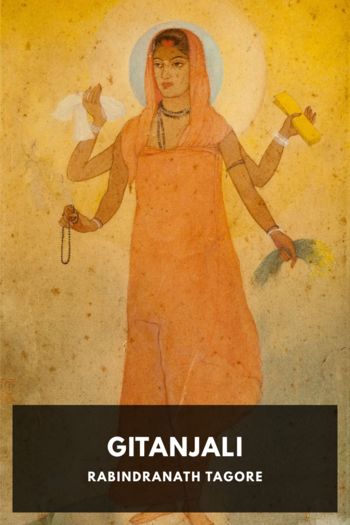My Reminiscences, Rabindranath Tagore [famous ebook reader .TXT] 📗

- Author: Rabindranath Tagore
Book online «My Reminiscences, Rabindranath Tagore [famous ebook reader .TXT] 📗». Author Rabindranath Tagore
Well do I remember the custard apple seed which I had planted and kept in a corner of the south verandah, and used to water every day. The thought that the seed might possibly grow into a tree kept me in a great state of fluttering wonder. Custard apple seeds still have the habit of sprouting, but no longer to the accompaniment of that feeling of wonder. The fault is not in the custard apple but in the mind. We had once stolen some rocks from an elder cousin’s rockery and started a little rockery of our own. The plants which we sowed in its interstices were cared for so excessively that it was only because of their vegetable nature that they managed to put up with it till their untimely death. Words cannot recount the endless joy and wonder which this miniature mountain-top held for us. We had no doubt that this creation of ours would be a wonderful thing to our elders also. The day that we sought to put this to the proof, however, the hillock in the corner of our room, with all its rocks, and all its vegetation, vanished. The knowledge that the schoolroom floor was not a proper foundation for the erection of a mountain was imparted so rudely, and with such suddenness, that it gave us a considerable shock. The weight of stone of which the floor was relieved settled on our minds when we realised the gulf between our fancies and the will of our elders.
How intimately did the life of the world throb for us in those days! Earth, water, foliage and sky, they all spoke to us and would not be disregarded. How often were we struck by the poignant regret that we could only see the upper storey of the earth and knew nothing of its inner storey. All our planning was as to how we could pry beneath its dust-coloured cover. If, thought we, we could drive in bamboo after bamboo, one over the other, we might perhaps get into some sort of touch with its inmost depths.
During the Magh festival a series of wooden pillars used to be planted round the outer courtyard for supporting the chandeliers. Digging holes for these would begin on the first of Magh. The preparations for festivity are ever interesting to young folk. But this digging had a special attraction for me. Though I had watched it done year after year—and seen the hole grow bigger and bigger till the digger had completely disappeared inside, and yet nothing extraordinary, nothing worthy of the quest of prince or knight, had ever appeared—yet every time I had the feeling that the lid being lifted off a chest of mystery. I felt that a little bit more digging would do it. Year after year passed, but that bit never got done. There was a pull at the curtain but it was not drawn. The elders, thought I, can do whatever they please, why do they rest content with such shallow delving? If we young folk had the ordering of it, the inmost mystery of the earth would no longer be allowed to remain smothered in its dust covering.
And the thought that behind every part of the vault of blue reposed the mysteries of the sky would also spur our imaginings. When our Pundit, in illustration of some lesson in our Bengali science primer, told us that the blue sphere was not an enclosure, how thunderstruck we were! “Put ladder upon ladder,” said he, “and go on mounting away, but you will never bump your head.” He must be sparing of his ladders, I opined, and questioned with a rising inflection, “And what if we put more ladders, and more, and more?” When I realised that it was fruitless multiplying ladders I remained dumbfounded pondering over the matter. Surely, I concluded, such an astounding piece of news must be known only to those who are the world’s schoolmasters!
Part II IV ServocracyIn the history of India the regime of the Slave Dynasty was not a happy one. In going back to the reign of the servants in my own life’s history I can find nothing glorious or cheerful touching the period. There were frequent changes of king, but never a variation in the code of restraints and punishments with which we were afflicted. We, however, had no opportunity at the time for philosophising on the subject; our backs bore as best they could the blows which befell them: and we accepted as one of the laws of the universe that it is for the Big to hurt and for the Small to be hurt. It has taken me a long time to learn the opposite truth that it is the Big who suffer and the Small who cause suffering.
The quarry does not view virtue and vice from the standpoint of the hunter. That is why the alert bird, whose cry warns its fellows before the shot has sped, gets abused as vicious. We howled when we were beaten, which our chastisers did not consider good manners; it was in fact counted sedition against the servocracy. I cannot forget how, in order effectively to suppress such sedition, our heads used to be crammed into the huge water jars then in use; distasteful, doubtless, was this outcry to those who caused it; moreover, it was likely to have unpleasant consequences.
I now sometimes wonder why such cruel treatment was meted out to us by the servants. I cannot admit that there was on the whole anything in our behaviour or demeanour to have put us beyond the pale of human kindness. The real reason must have been that the whole of our burden was thrown on the servants, and





Comments (0)